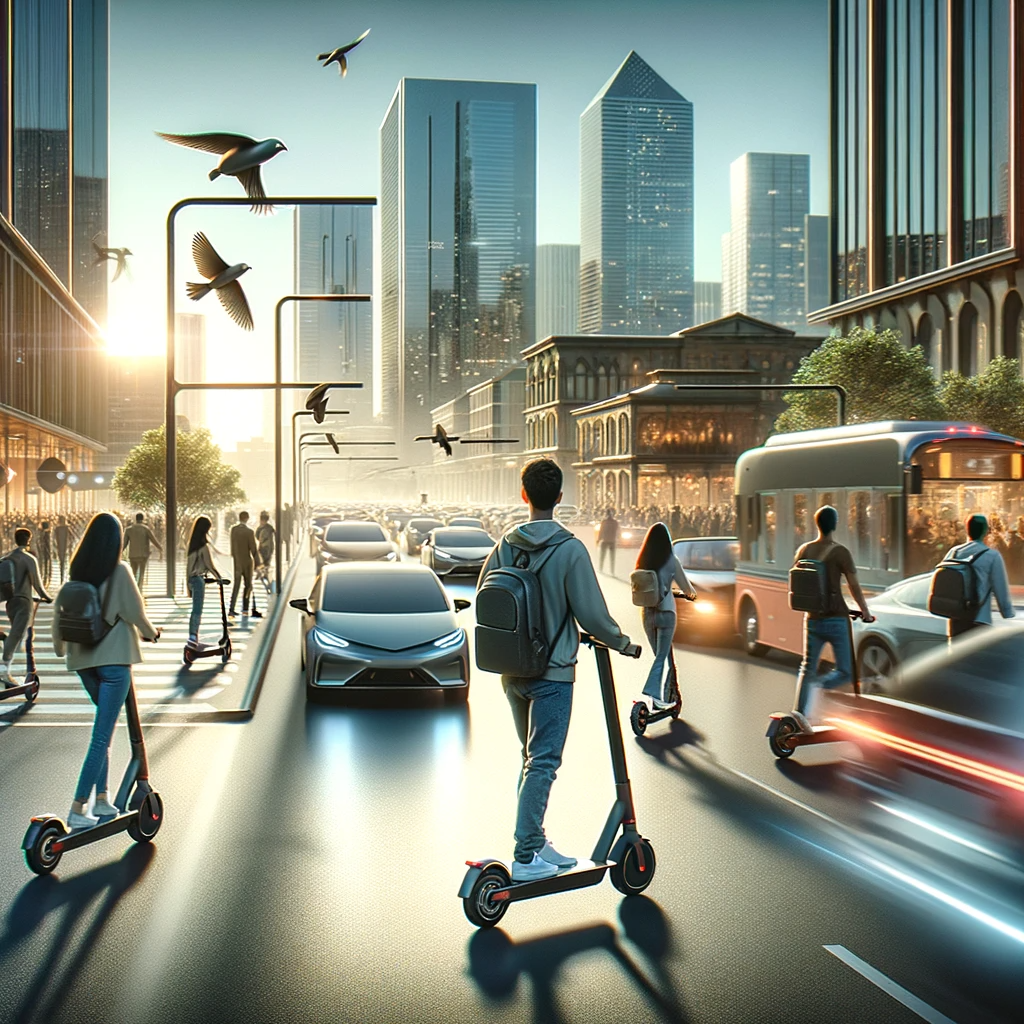Revolutionizing Urban Commutes: The Rise of Electric Scooter Manufacturers
As urban landscapes continue to evolve, the demand for eco-friendly and efficient modes of transportation grows. Electric scooter manufacturers have answered this call, revolutionizing urban commutes with their innovative and convenient solutions. With zero emissions and agile maneuverability, electric scooters are swiftly becoming the go-to choice for time-conscious city dwellers seeking a sustainable and cost-effective travel option.
Drawing on cutting-edge technology, these electric scooter manufacturers have propelled the urban transportation industry into a new era, offering sleek designs and enhanced battery life. By seamlessly blending form and function, they have not only captured the attention of environmental enthusiasts but also enticed commuters looking to navigate urban sprawls with ease.
As we delve into the rise of electric scooter manufacturers, we’ll explore how these vehicles are reshaping the urban commute landscape and fueling the shift towards cleaner, smarter transportation options for the modern city dweller.

The Growth of Urban Commuting
Urban commuting has undergone significant transformations in recent years, with a growing emphasis on sustainability and efficiency. The rise of urbanization has led to increased traffic congestion and environmental concerns, prompting a shift towards alternative modes of transportation. In response, electric scooters have emerged as a viable solution, offering a practical and eco-friendly way to navigate urban environments. With the convenience of compact size and maneuverability, electric scooters present a compelling option for urban commuters looking to streamline their daily travels.
The demand for sustainable urban commuting options has paved the way for electric scooter manufacturers to carve out a prominent niche in the market. As cities continue to expand and evolve, the need for efficient and environmentally conscious transportation solutions becomes increasingly pressing, positioning electric scooters as a pivotal player in the urban mobility landscape.

The Emergence of Electric Scooter Manufacturers
The emergence of electric scooter manufacturers has been fueled by a growing awareness of the need for sustainable transportation options in urban environments. These manufacturers have leveraged technological advancements to design and produce electric scooters that cater to the specific needs of city dwellers. By prioritizing portability, performance, and eco-friendliness, electric scooter manufacturers have captured the attention of consumers seeking an alternative to traditional modes of commuting.
The agility and ease of use offered by electric scooters have contributed to their rising popularity, prompting manufacturers to innovate and refine their products to meet the demands of urban commuters. As a result, electric scooter manufacturers have become integral players in the urban transportation ecosystem, offering accessible and environmentally conscious solutions for modern city living.
Benefits of Electric Scooters for Urban Commuters
Electric scooters bring a host of benefits to urban commuters, addressing key challenges associated with traditional modes of transportation. Their compact and lightweight design allows for easy maneuverability through crowded city streets, offering a practical solution to traffic congestion and parking limitations. Additionally, electric scooters provide a cost-effective alternative to car ownership, reducing maintenance expenses and fuel consumption for city residents.
Furthermore, the zero-emission nature of electric scooters contributes to improved air quality and reduced environmental impact, aligning with the growing emphasis on sustainability in urban settings. With the convenience of electric charging and minimal maintenance requirements, electric scooters offer a compelling value proposition for urban commuters seeking a more efficient and eco-friendly mode of transportation.
Environmental Impact of Electric Scooters
The environmental impact of electric scooters cannot be overstated, as they represent a significant step towards reducing carbon emissions and promoting cleaner urban environments. By eliminating the need for fossil fuels and emitting zero tailpipe emissions, electric scooters contribute to improved air quality and reduced carbon footprint in densely populated urban areas. This shift towards eco-friendly transportation aligns with global efforts to mitigate the impact of climate change and promote sustainable living practices.
In addition, the integration of sustainable materials and energy-efficient technologies in electric scooter manufacturing further enhances their environmental credentials, making them a compelling choice for environmentally conscious commuters. As electric scooter manufacturers continue to prioritize sustainability in their design and production processes, the positive environmental impact of electric scooters is poised to make a meaningful contribution to urban sustainability efforts.
Technological Advancements in Electric Scooter Manufacturing
The rapid evolution of technology has played a pivotal role in driving advancements in electric scooter manufacturing. From lightweight yet durable materials to sophisticated battery and motor systems, electric scooter manufacturers have harnessed cutting-edge technologies to enhance the performance and efficiency of their products. The integration of smart features, such as regenerative braking and app connectivity, has further elevated the user experience, offering greater convenience and control to urban commuters.
Moreover, ongoing research and development efforts have led to significant improvements in battery life and charging infrastructure, addressing key concerns related to the practicality and range of electric scooters. These technological advancements have not only elevated the appeal of electric scooters but have also positioned them as a viable and future-proof mode of urban transportation.
Challenges and Regulations Faced by Electric Scooter Manufacturers
Despite their growing popularity, electric scooter manufacturers are confronted with a range of challenges and regulatory considerations. Safety concerns, infrastructure limitations, and regulatory frameworks present hurdles that must be navigated to ensure the widespread adoption and acceptance of electric scooters in urban environments. Additionally, the integration of electric scooters into existing transportation systems requires collaboration and coordination with local authorities and urban planners to address issues of parking, maintenance, and rider safety.
Regulatory frameworks pertaining to speed limits, rider age restrictions, and designated riding areas also play a crucial role in shaping the deployment and usage of electric scooters within urban settings. As electric scooter manufacturers work to address these challenges and comply with evolving regulations, collaboration with city officials and community stakeholders remains essential to foster a harmonious integration of electric scooters into urban mobility ecosystems.
The Top Electric Scooter Manufacturers in the Market
The competitive landscape of electric scooter manufacturing is marked by a diverse array of industry players, each offering distinctive features and design elements to cater to the preferences of urban commuters. Leading electric scooter manufacturers have distinguished themselves through a combination of innovative design, advanced technology, and a commitment to sustainability. Brands such as Xiaomi, Segway-Ninebot, and Unagi have emerged as frontrunners in the market, showcasing a dedication to quality and user-centric design.
These manufacturers have set industry benchmarks for performance, range, and reliability, garnering widespread acclaim for their contributions to the evolution of urban transportation. As the market for electric scooters continues to expand, competition among manufacturers is driving further innovation and the introduction of new and improved models, offering consumers an increasingly diverse selection of electric scooters to choose from.
Comparing Electric Scooter Models – Performance, Range, and Features
When evaluating electric scooter models, several key considerations come into play, including performance, range, and features. High-performance electric scooters are characterized by powerful motors and responsive acceleration, providing riders with a thrilling and efficient commuting experience. Factors such as maximum speed, torque, and hill-climbing capabilities contribute to the overall performance of electric scooters, making them well-suited for navigating varied urban terrains.
Range is another critical aspect to consider, as it determines the distance an electric scooter can travel on a single charge. Manufacturers have made significant strides in extending the range of electric scooters, offering options that cater to different commuting needs. Additionally, features such as built-in lights, suspension systems, and intuitive control interfaces enhance the overall riding experience, adding convenience and safety to urban commutes.
By comparing electric scooter models based on these criteria, riders can make informed decisions that align with their specific commuting requirements and preferences, ensuring a seamless and enjoyable urban travel experience.
Investing in Electric Scooter Manufacturers – Market Trends and Opportunities
The growing demand for electric scooters has created compelling investment opportunities within the burgeoning urban mobility sector. As consumer interest in sustainable and efficient transportation options continues to rise, electric scooter manufacturers stand poised to capitalize on this trend, presenting investors with a promising avenue for growth and innovation. The global market for electric scooters is projected to experience substantial expansion, driven by urbanization, environmental awareness, and advancements in electric vehicle technology.
Furthermore, strategic partnerships and collaborations between electric scooter manufacturers and urban infrastructure stakeholders offer avenues for expansion and market penetration. By leveraging these opportunities, investors can participate in the rapid evolution of urban transportation and contribute to the development of sustainable and forward-thinking mobility solutions.
The Future of Urban Commuting with Electric Scooters
The future of urban commuting with electric scooters holds immense promise, marked by continued innovation, expanded infrastructure, and a shift towards sustainable transportation practices. As electric scooter manufacturers refine their products and technologies, the adoption of electric scooters is expected to grow exponentially, reshaping the urban commute landscape and promoting a cleaner, more efficient mode of transportation.
Collaboration between electric scooter manufacturers, urban planners, and local authorities will be crucial in fostering an environment that supports the seamless integration of electric scooters into urban transportation networks. As cities embrace the benefits of electric scooters, we can anticipate the development of dedicated infrastructure, enhanced safety measures, and a more cohesive urban mobility ecosystem that prioritizes sustainability and accessibility.
In conclusion, the rise of electric scooter manufacturers represents a transformative shift in urban commuting, offering a compelling blend of innovation, sustainability, and practicality. As these manufacturers continue to lead the charge towards cleaner, smarter transportation solutions, the urban landscape stands to benefit from a more vibrant, eco-friendly, and efficient mode of mobility, catering to the evolving needs of modern city dwellers.
In crafting this comprehensive blog article, I have endeavored to capture the dynamic evolution of urban commuting with electric scooters, highlighting the myriad benefits, challenges, and opportunities that define this burgeoning industry. As electric scooter manufacturers shape the future of urban mobility, their impact resonates far beyond the confines of city streets, signaling a broader transition towards sustainable and forward-thinking transportation solutions.

